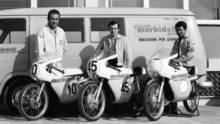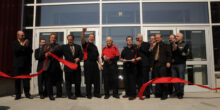1. Get ready for the game before arriving at work. “A salesperson should, on their drive to work, get their sales game and attitude lit up. They should think of a goal for the day and a plan to achieve it,” advises Steve Lemco, author of “You Gotta-Wanna.” “Getting mentally prepared is always the beginning formula to score early.”
2. Get excited. “Salespeople have been forced to endure rejection more so than ever before. It is because of this that I believe most sales staffs have become apathetic to their customers and rarely even get up from their desks to greet a customer,” said Derek Sanders of DS1 Consulting. “No excitement means no sale, unless they were coming in to buy in the first place.”
3. Prospect. Salespeople should be finding sales, rather than waiting for people to come through the door, says Wayne Bedeaux of Leo’s South in Lakeville, Minn. “I think one thing they probably don’t do enough of is prospecting, especially when it’s slow.”
4. Collect customer information. “Collect complete customer information, — including email addresses — for every transaction,” recommends Dan Witmer of Gear Head in Ottawa, Canada. “This is critical to our database for email campaigns and customer follow-up and also maintaining complete customer purchase and service history.”
5. Ask for the sale. “The best sales processes out there are designed to force this step in the process and do it in a way that is not pushy or scary for the customer. I have seen even mediocre sales people achieve top salesman status just by following the process of making it easy to own,” Sanders said.
6. Use positive words and phrases. “Instead of saying, ‘No, I can’t get that; the supplier doesn’t have it right now; that’s not on sale; it won’t be here until next week; I know it’s expensive,’ staff should be saying ‘I’ll do my best to find it for you; I’ll have it rushed when it comes off back order; I have a similar item on special; we’ll do our best to get it for you as quickly as possible; that’s the best value item.’ This will increase sales and give the customer a more positive experience,” Witmer said.
7. Follow-up with sales customers. “Call just to see how they’re liking their bikes and stuff,” Bedeaux said. Despite knowing follow-up is necessary, many salespeople fail to do it, he added.
8. Look for sales in other departments. “It has been my experience that when a sales person can effectively drive a conversation with a customer explaining to him/her that the dealership is looking for bikes just like theirs as trades and is giving top dollar, this creates opportunity, and no one else is doing it,” Sanders explained.
9. Improve sales skills. “Don’t tell customers that the Internet is cheaper and that they buy all their stuff that way,” Witmer suggested. “Upsell items based on advanced features or value; make suggestions for add-ons — oil should always be sold with a filter, sunglasses/headwrap with a shorty helmet, leather conditioner with a jacket or boots, bead balancing with a tire.”
10. Study each day’s performance. “At the end of the game, all professional sportsmen go over the game films of the last game. On your drive home, salespeople should do the same. They should make a mental note of all the things that need to happen in tomorrow’s game. Most important, they need to ask themselves an important question and be honest about the answer as there is nobody to lie to except themselves, ‘Did they win today’s game?’” Lemco said.








